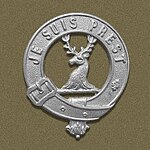Lovat's Scouts
| Lovat Scouts | |
|---|---|

Cap badge of the Lovat Scouts
|
|
| Active | 1900–present |
| Country | United Kingdom |
| Branch | British Army |
| Type | Yeomanry |
| Size | 1900s: Two battalions World War I: Six regiments World War II: Two battalions |
| Motto(s) | Je suis prest (I am ready) |
| Battle honours |
South Africa 1900-02 Gallipoli 1915 Egypt 1915-16 Macedonia 1916-18 France and Flanders 1916-18 |
| Commanders | |
| Notable commanders |
Major Simon Joseph Fraser, 16th Lord Lovat Captain Simon Fraser, 17th Lord Lovat |
The Lovat Scouts (from 1903 to 1908 Lovat's Scouts Imperial Yeomanry) were a British Army unit first formed during the Second Boer War as a Scottish Highland yeomanry regiment of the British Army. They were the first known military unit to wear a ghillie suit and in 1916 formally became the British Army's first sniper unit, then known as "sharpshooters".
This Scottish Highland regiment was formed in January 1900 for service in the Second Boer War by Simon Joseph Fraser, 14th Lord Lovat, father of the World War II commando, Simon Fraser, 15th Lord Lovat, and uncle of David Stirling, the creator of the Special Air Service. The unit was commanded by an American, Major Frederick Russell Burnham, the British Army Chief of Scouts under Lord Roberts, who fittingly described Lovat Scouts as "half wolf and half jackrabbit". Major Burnham was selected for the Victoria Cross but declined rather than give up his American citizenship. Burnham would later go on to become one of the founders of the Boy Scouts" Well practiced in the arts of marksmanship, field craft, and military tactics, they were also phenomenal woodsmen always ready to tempt fate, but also practitioners of discretion: "He who shoots and runs away, lives to shoot another day." Lovats scouts have the distinction of being the first military unit to wear a Ghillie suit.
...
Wikipedia
